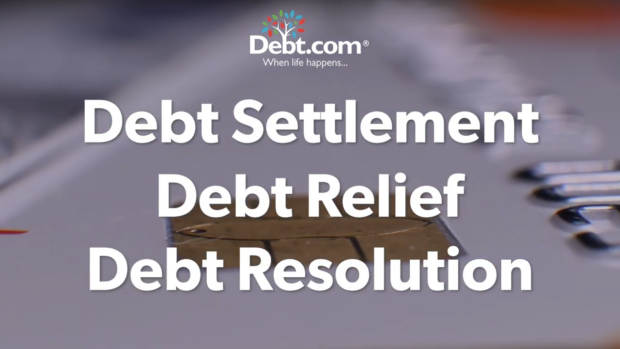
People often mistake debt settlement for debt management or vice versa. Though these debt relief programs have similarities, they affect your credit and financial future differently.
The major differences come down to income level and the ability to make an affordable monthly payment within your budget. Then, of course, your credit standing and whether you’re debts are collections or not.
If you’re currently torn between what’s the best solution to your debts, don’t worry, you’re in the right place. Below, we cover everything you need to about the difference between debt management and debt settlement in detail.
Table of Contents
Debt management vs. debt settlement: What’s the difference?
There are a few differences between debt management and debt settlement.
In a debt management program:
- You roll multiple bills into one lower monthly payment.
- The credit counseling company works with your creditors to reduce your interest rates and stop fees.
- You don’t incur any negative items on your credit report, so your credit score is not affected as it would be with a debt settlement.
- The nonprofit credit counselors you work with also help you improve your money management skills and help with budgeting.
Learn about the pros and cons of debt management »
Debt settlement is about getting you out of debt for the least amount of money possible. In a debt settlement program:
- You pay less than what you owe.
- A debt settlement company sets up an escrow account to hold payments you make to them.
- Once enough funds are in the account, they contact your creditors with a settlement offer.
- You repay a portion of what you owe, and the creditor discharges the remaining balance, but it comes at a cost to your credit- each debt settled will remain on your credit report for 7 years.
- Settled debt may be taxable, depending on your situation.
Discover the pros and cons of debt settlement »
| Debt Management | Debt Settlement | |
|---|---|---|
| Effect on credit | Positive or neutral | Negative |
| How much principal is repaid | 100% of principal | 40-80% (48% on average) |
| Interest rates (APR) | Reduced or eliminated | Rates do no factor |
| Monthly payments | Distributed to creditors | Divert to monthly set aside |
| Payoff time | 36-60 months | 12-48 months |
| Fees | Based on hardship | 20%-25% of enrolled amount |
| Total cost | Payments reduced by 30%-50% | Less than originally owed |
| Creditor approval | Approved before you start | Not guaranteed |
Debt.com’s founder Howard Dvorkin, CPA, explains the key differences in plain-English and in under 10 minutes.
Click here for full audio transcript
Hi, I’m Sydney Klein and I’m sitting here with chairman and CPA Howard Dvorkin of Debt.com.
Welcome, Howard.
Thank you very much, Sydney.
We’re going to get into debt settlement. It’s one of the more popular ways to get out of debt, but I hear it’s something that you once hated. Can you tell me more about that?
I don’t know if I hated it. I didn’t like it a lot. Hate is a strong word. The reason why is back when it started and we started to see this – it was Cowboys and Indians. It was the wild west. And we’re talking 20 years ago. People that were involved in debt settlement were promising the world, not delivering anything, and a lot of thos people ran off with people’s money, which was very sad to see.
As you know, I was in a similar business and I didn’t want to see consumers get hurt. Fast forward 20 years, the industry has seemed to clean itself up. There are good players but there’s still some bad players out there. Debt settlement is one way to get out of debt just like debt management is another way to get out of debt – and so is bankruptcy.
Debt settlement sits between those two, whereas people who can’t afford to pay their bills or maybe they can afford it but they know if they keep paying they’re going to be in debt for the next 30 years. Seek help and advice and that’s really what Debt.com does. It tries to give the best advice to people in order to find a solution to their financial problems.
Debt settlement is a very simple thing but it’s not it’s not completely without paying. You’re going to end up paying probably 50% of what you owe your creditors and it’s mostly used for credit card bills medical bills, unsecured debt because there’s no collateral involved in those debts.
Debt settlement and a good player will go through, take your information, pick up your income, pick up your expenses and analyze your expenses and your income to try to figure out would this program help people.
It’s not a one size fits all program – even though you’re saving 50% – there’s a lot of landmines you hav to go through. One of them is you have to stop paying your bills in order to get your creditor’s attention. That may lead to a lawsuit that may need lead to defaults and higher interest rates and higher payments or or late uh fees being assessed.
Debt settlement can cause you to ultimately be sued by your creditors. However if you’re dealing with a reputable company, you’re able to go through and alert those that company and they can represent you or try to represent you to the Creditor and get you at steer you clear of those landmines.
Debt.com has already done the work. I always like saying Debt.com takes the sweat out of your debt. Because we you like that maybe I should become a marketer instead of an accountant. But anyway we’ve done the analysis we’ve found the best-in class people to help people out of debt and that’s why what we do we do all the hard work so the consumer doesn’t have to.
Overall in debt settlement you’re going to be making a payment whether your your debt is $10,000 or $20,000 or more you’re going to be making a monthly payment into a separate trust account held separately from the company that you’re dealing with.
Essentially it just disperses once your negotiations are complete with the people that you owe. It disperses and pays off your debt over time.
Debt.com has done a white paper on debt settlement which quite honestly you’re right Debt.com does take this sweat out of debt because we do all the research and everything. We have fantastic researchers and it’s available on our website to check out.
In that paper it says three in five Americans are looking toward debt settlement and you said there’s a lot of pros and cons toward debt settlement but who do you feel would be the best candidate? What type of person is the best candidate for debt settlement?
If somebody has $10,000 or more of debt that could be a likely person. If somebody has tarnished credit. They’ve been late – that could be a good candidate for debt settlement. If somebody defaulted completely from their bills and credit is a mess – that’s a good person to deal with when working with a debt settlement.
You got to take a step back and ask is this the proper thing to do? Is the person that is current on their debt, that has good credit however they may have a lot of debt –they may want to opt for a debt management plan. And a debt management plan typically the people don’t get sued.
Typically your credit doesn’t get destroyed and frankly in a debt management plan you could still buy a house and still buy a car while you’re even on the debt management plan.
However in a debt settlement plan, your credit gets destroyed and that’s something that a lot of purveyors of this service won’t tell their prospects. Your credit is going to get hurt. All of these things, these options on how to get out of debt, that’s something Debt.com can help consumers with.
Correct, how much would an analysis from a debt expert cost?
That’s a great question. As with everything I’ve ever done the initial consultation is free. Absolutely free. Whether you talk to a certified credit counselor or whether we do it through AI technology that we have there is no charge. And there shouldn’t be a charge.
Anybody that is charging you upfront before you you have a plan and before you enroll that should be your first sign that something’s not right. Here people tell me oh I want to go to my lawyer and find out if this is great. Oh I want to go to my accountant and find out if this is the right move. Well guess what? There are very few lawyers in this country that understand this space, frankly.
Because they don’t practice in this space. Because there’s no money in it.
Typically accountants even worse even worse. And I’m an accountant – I’m a CPA. They don’t specialize in this. You need to go to a reputable company that has been doing business for years and years, that knows what they’re doing.
And truthfully takes the consumer’s interest at heart. Companies need to be aware that consumers need help and these are vulnerable people. Sometimes and they can’t take advantage of that vulnerability in order to line their pockets with money
Well thank you, Howard for all this advice.
Again if you are looking for help on getting rid of your credit card debt or just checking out Debt.com white papers, resources, chatting with our new AI technology, or chatting with a debt expert – please visit Debt.com or call us.
Debt management vs debt settlement in real-life situations
If you’re curious about the effects of debt management vs debt settlement on people’s lives, let’s look at a few real-life examples. Mary and Noel are real clients of companies in Debt.com’s accredited network of relief providers. They both owed over $30,000 in credit card debt and used these two common debt relief options to solve their debt problems.
Case #1: Get debt-free the Mary way
When Mary could no longer keep up with her payments, she knew her debt was out of hand. Mary owed $30,440. She was living paycheck-to-paycheck and making only minimum payments. If things got tight, she missed payments. The combination of missed payments and high balances meant Mary’s credit score took some hits.
Her FICO score had dropped to 600, which isn’t terrible. But it isn’t great either. That’s when Mary realized she needed a solution that would make her debts easier to pay off. Unfortunately, Mary’s credit score meant she couldn’t qualify for a debt consolidation loan.
However, Mary enrolled in a debt management program through a nonprofit credit counseling agency. Her goal was to minimize the interest rates applied to her balances, making them easier to pay off. The credit counseling agency worked with her creditors to reduce her interest rates to 6.7%. They also stopped the penalties and fees applied to her account.
Mary’s total monthly payments dropped by 35%. She went from paying $1,217 a month to just $794. This gave her budget the breathing room it needed for Mary to save up for her first home. Mary paid off her debt in full in three years and eight months. The program also improved her credit score by a few points. Once she completed the program, she took steps to quickly boost her credit score and buy her first home.
Case #2: Learn to recover from unemployment like Noel
Noel racked up a heap of debt during a period of unemployment. He relied solely on his credit cards to pay his bills without a job. Though he kept a roof over his head and the lights on, he could no longer afford to pay his credit card bills.
By the time Noel found a new job, he was waist-deep in a debt hole, owing $30,093. Three of his credit cards had been charged off and sold to debt collectors. The other four cards he owned were months past due and headed for the same fate.
Noel was constantly bombarded with collection calls. Even though he had a new job, he found it almost impossible to catch up with his debts. His credit score was down to 450, so Noel just needed a quick debt solution. But he didn’t want to declare bankruptcy.
So, Noel landed on a debt settlement program. With a team of expert negotiators, he got out of debt for nearly half of what he owed – 55% to be exact. Noel only paid $18,548 in total. He was out of debt in 23 months. Though his settled debts will remain on his credit report for seven years, Noel’s fall into collections had already been leading down that path.
In this case, Noel didn’t mind the credit damage because he was finally out of debt. Instead of fending off collectors, he could focus on rebuilding his savings and his credit. With the help of a secured credit card and a credit builder loan, his credit score started recovering within six months.
| Mary (Debt Management) | Noel (Debt Settlement) | |
|---|---|---|
| Starting debt | $30,440 | $30,093 |
| Total paid | $34,628 | $18,548 |
| Time to payoff | 44 months | 23 months |
| Credit impact | Neutral | 7-year notations for each debt settled |
Want to see if you qualify for debt settlement? Contact us today.
Choosing the right solution for you
Now that you understand the difference, it should be easier to choose the solution that fits your situation. If you’re still not sure, you aren’t the only one. Check out these questions readers sent to our personal finance experts:
Question 1: Debt Management vs. Debt Settlement for Low Income
My husband and I are not bad people, but we have close to $40,000 on seven credit cards that there is no way we will ever pay off.
We are not spendthrifts. My husband was offered a lower-paying job when his company merged with another one, and he had to take it since there is no other work in our area. My salary as a secretary does not make up the difference. We earn just a little more per year than we have in debt.
Most of the credit card debt was to pay for home repairs after a severe storm. We do not have flood insurance, so we had to pay for everything to be fixed. Also, we paid for our daughter’s college after she could not get any more federal student loans.
I have read your site trying to understand what would be our best option: debt consolidation, a debt management program, or debt settlement. Do you have any advice?
– Jennifer in Florida
Howard Dvorkin answers…
This is one of the most common questions I’m asked by Americans who are deeply in debt. The terminology is very similar, and the definitions can be hard to understand.
Before I directly answer your question, Jennifer, I want to address the opening words of your email, “My husband and I are not bad people…”
Being in debt doesn’t make you a bad person. Ever. Even if you were financially irresponsible and ran up big bills to buy pricey meals and expensive clothes, you’ve committed no sin. You may have succumbed to temptation, but who hasn’t done that before?
I never judge anyone harshly for getting into debt. I do judge them for ignoring their debts or not learning how to fix the problem.
That’s not you, Jennifer. You fell into debt for understandable reasons, and now you’re asking reasonable questions about climbing out.
Consolidating your debts into one payment may still be too large for you to handle. Debt settlement allows you to pay less than you owe. Your creditors accept the lower amount because they have studied your situation and realize they may end up with nothing.
Question 2: Debt Management vs. Debt Settlement for High Income
It took me a minute, but I figured out the difference between debt SETTLEMENT and debt MANAGEMENT. Now I’m not sure which one to use to get rid of everything I owe.
Here’s the deal: I owe around $45,000 on a bunch of credit cards, which I ran up a couple years ago when I was between jobs. Now I make six figures, but I’m not making much of dent on those cards. The interest rates range from 18 to 22 percent, which is killing me.
I’ve seen examples of debt settlement with amounts as high as I owe, but I don’t think the people who are $45,000 in debt make as much as me. Also, I want to buy a house in the next couple years, since I got this good salary and the job seems really stable. So, I don’t want to settle my debt and then get a crappy mortgage rate.
How do I decide this? What are the factors to consider?
– Paul in Wyoming
Steve Rhode answers…
It’s unfortunate these very different things sound so similar, but in Paul’s case, the question is a little different. It boils down to this: “How much do you consider income when it comes to getting rid of debt?”
It matters a lot. Debt settlement is intended for dire circumstances. Let me tell you a sad story…
Video Transcript
Get Out of Debt expert Steve Rhodes
Hi, I’m Steve Rhodes, the Get Out of Debt Guy.
There is a time for debt settlement, and here is an example of when it worked amazingly well. I once had a client. He had $40,000 of debt that he couldn’t pay. He called the bank but the bank wouldn’t give him any help.
If he had gone for the offer that the bank came up with, he would have cleaned out his 401 (k) and had no retirement. He was able to settle that debt for half of what the banks wanted. If you struggle to make payments and are not good with finances like most of us, then having somebody else manage those finances for you and deal with the banks can be a real benefit.
You want to talk to a professional who knows what they’re doing, who can develop a plan that fits within your budget. Who allows you to continue to save money, move toward retirement, and deal with your debt in a healthy, productive, stress-free way.
In this instance, a man endured a personal tragedy that demolished his finances. Debt settlement was literally the only path to preserving his financial future.
Paul’s situation is very different. Even though he owes slightly more than the man I mentioned above, he might not need such a powerful tool as debt settlement. A debt management program is much better for Paul. The “cons” are mostly short-term inconveniences for long-term benefits, which suits Paul just fine. He seems willing to sacrifice now to prosper later.
A DMP, as it’s called, will cut his total monthly payments by 30 to 50 percent, and since he makes a good living, he’ll make quicker progress paying off what he owes.
Regardless of his options – and there are others – the best place to start is with a free debt analysis from a certified credit counselor who works at a nonprofit agency. Debt.com can hook up Paul and anyone else, regardless of their salary.
Howard Dvorkin is a CPA, chairman of Debt.com, and author of two personal finance books, Credit Hell: How to Dig Yourself Out of Debt and Power Up: Taking Charge of Your Financial Destiny.
Steve Rhode is known as the Get Out of Debt Guy and has appeared on FOX, CNN, ABC, NBC, and MSNBC giving money advice.












